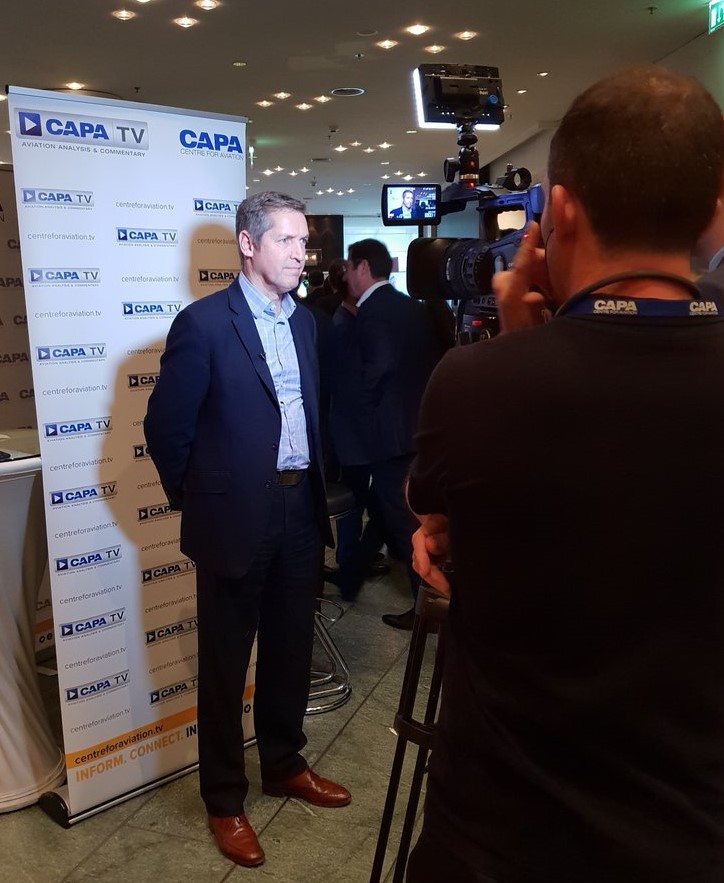CAPA - Centre for Aviation attempted to address those questions with its World Aviation Outlook Summit, which had more than nine hours of agenda content designed to provide a market outlook for 2019 and review the commercial and operational pillars that will drive global airline strategic decision-making.
Here's some of the key insights and observations from delegates during the event at The Grand Hyatt Berlin in Germany's capital city…
Airbus SVP business analysis: ROI 'not quite enough to really build for the future'
Airbus SVP business analysis and market forecast Bob Lange said despite an "eighth year of impressive profitability" at Airbus, return on investment (ROI) is "not quite enough to really build for the future". Half of the USD56 billion of industry profits were generated in the US alone, Mr Lange noted. "We shouldn't be comfortable with that situation", he continued, adding the industry still needs to become more consistently profitable on a global basis.
Finnair chief commercial officer: NDC will make a 'huge difference' compared with GDS channels
Finnair chief commercial officer Juha Jarvinen said NDC will distribute ancillary elements much better than the carrier can through GDS. 50% of passengers buying on finnair.com buy ancillary items, Mr Jarvinen said, adding the carrier has improved GDS channels to sell ancillary, with one in 10 purchasing ancillaries compared with one in 100 passengers three years ago. There is still a "huge difference" compared to what can be done with NDC, Mr Jarvinen concluded.
Deutsche Lufthansa CEO: Berlin as a third hub 'not realistic'
Deutsche Lufthansa AG chairman and CEO Carsten Spohr, commenting on Berlin as a future hub operation disagreed that a third hub is possible in Germany, adding already operating with two hubs is suboptimal for aircraft utilisation and a third is "not realistic".
LOOK OUT...  Exclusive executive interviews from Berlin will be published on CAPA TV in the coming weeks, as well as full coverage of the agenda sessions.
Exclusive executive interviews from Berlin will be published on CAPA TV in the coming weeks, as well as full coverage of the agenda sessions.
Whitaker Air Space: Brexit negotiations hold 'no upside for the industry'
Whitaker Air Space principal Michael Whitaker said Brexit an "unusual negotiation when the best case scenario is the status quo". He added negotiations provide "no upside for the industry, the focus is only on managing the downside".
LOT Polish Airlines CEO: LCCs 'contributed significantly' to EU connectivity aims
LOT Polish Airlines CEO Rafał Milczarski said Central Europe was traditionally less affluent due to historical events, and therefore much less developed. He said LCCs have earned respect in these markets. Their business models have brought on significant market growth and "contributed significantly to the political aims of the EU" due to the services they offered within Europe to rapidly boost connectivity.
AAPA: Asia airline profitability 'patchy' in past five years, falling behind the US
Association of Asia Pacific Airlines (AAPA) director general Andrew Herdman said profitability has been "patchy" for Asian carriers in the past five years, while US carriers have captured half of global profitability. "To enjoy future growth you have to survive current competition today", Mr Herdman stated, noting the region hasn't witnessed the "same number of failures as we have seen in Europe", with "a lot of appetite" apparent to set up new carriers and the financing to do so.
airBaltic CEO comments on flexibility of full service business/ULCC mix
airBaltic chairman and CEO Martin Gauss said the carrier immediately implemented full service business class parallel with ultra low cost (ULCC) seats in its economy section. "We had to have that product" in order to compete with LCCs, he continued. "In times where there is demand" for business class revenues improve, he argued, whereas in times of low business demand the carrier has the flexibility to fall back on ultra low cost seats.
DLR director: Airport capacity restraints a global problem and not just a European one
German Aerospace Center (DLR) director Dr Johannes Reichmuth said European planning processes "tend to take longer than in other regions", however airport capacity constraints remain a global problem and not just a European one. Dr Reichmuth said planning processes become more complex and sophisticated to take into account interests of all interest groups affected by airport infrastructure.
CAPA: HSR to continue to impact China travel market as pax diverted from air to rail
CAPA - Centre for Aviation executive chairman Peter Harbison commented on the impact of high speed rail (HSR) on the China travel market, stating it will become increasingly marked as it diverts traffic from air to rail. As aviation becomes more congested, rail will become "much more attractive", Mr Harbison added, growing with increased city-to-city rail connectivity and some 47,000km of rail by around 2030.
[perfectpullquote align="full" cite="" link="" color="" class="" size=""]MORE INSIGHTS…
CAPA - Centre for Aviation members were able to see live updates from the CAPA World Aviation Outlook Summit and have access to over 100 briefs from the event. Find out more about how a CAPA membership provides a front row seat to global aviation news, analysis and data as it happens, with access to a comprehensive suite of tools that can be customised to your needs.[/perfectpullquote]